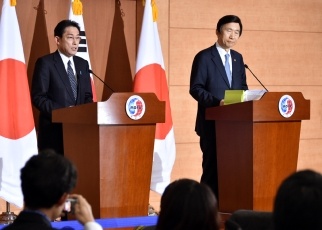In the last seventy years, relations between Japanese and Koreans have not been easy. In spite of centuries of cultural interaction, trade, and religious connections, the memory of Japanese occupation and WWII exerted a powerful impact over the relations between Japan and two Koreas.
With its nuclear program and military provocations, Pyongyang has been a difficult partner to deal with. Seoul and Tokyo, however, in spite of their common alliance to the United States and the official normalization of diplomatic relations in 1965, have lingered in the condition of “almost allies” for decades.
Most of the animosity is connected to the historical memory of Japanese occupation of Korea.
Thousands of families were affected by it, in different ways. Men were conscripted in the Empire’s armies, but women had a different fate. Thousands of young women were forced into prostitution in military brothels; they were euphemistically referred to as “comfort women”.
Koreans and Chinese have continuously lamented Japan’s reluctance to apologize for its war crimes. Japanese governments leaded by Nakasone, Koizumi and Abe, heading vast centre-right coalitions striving to celebrate the country’s culture and history, often inflamed criticism for visiting Yasukuni shrine (a sanctuary in Tokyo which honors the souls of those died in service of the Empire of Japan, a few people condemned as criminal of war among these) or promoting revisions of Japanese history textbooks.
The agreement reached on December, 28 over the issue of “comfort women” between Tokyo and Seoul, therefore, is historically pregnant. Abe Shinzō, for the first time, expressed in his official capacity as Prime Minister of Japan “his most sincere apologies and remorse to all the women who underwent immeasurable and painful experiences and suffered incurable physical and psychological wounds as comfort women”. Japanese government recognized the “involvement” of the Japanese military authorities at that time (当時の軍の関与), and its “responsibility” (責任を痛感している) for the “grave affront to the honor and the dignity of large number of women” (多数の女性の名誉と尊厳を深く傷つけた問題).
The agreement reached between the two countries envisions the establishment of a foundation by the Government of the Republic of Korea for the purpose of providing support for the former comfort women, the contribution by the Government of Japan through its budget, and the cooperation between the two governments in the project in order to “recover the honor and dignity and heal the psychological wounds of all former comfort women” (全ての元慰安婦の方々の名誉と尊厳の回復,心の傷の癒やしのため).
Strained by decades of hostilities, many argue that the attempt at reconciliation is insufficient; others that it comes late. Yet it is a good start for improving relations between the two countries, and quite a surprising move for the Abe administration, who has been often described as heading toward a revisionist stance.
Picture reference
Meeting between Fumio Kishida and Yun Byung-se, Foreign Ministers of Japan and Korea, on December 28, 2015.

